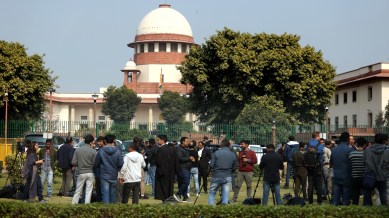WHILE IT refused to stay the implementation of the Citizenship (Amendment) Act Rules notified earlier this month, the Supreme Court on Tuesday issued notice to the Centre, asking it to respond to petitions challenging the Rules.
“Solicitor General Tushar Mehta submits that four weeks time may be granted to file response to the applications for stay at this stage. The request of four weeks time is opposed on the ground that in the meantime, if citizenship were to be granted, that process would become irreversible. Bearing in mind all the facts and circumstances, we direct that the proceedings be listed on April 9,” the bench, which included Justices J B Pardiwala and Manoj Misra, said.
The bench asked the Centre to file its reply by April 2, after which the petitioners would have to respond by April 8.
Appearing for the Centre, Mehta said there were 236 petitions challenging the Act, and 20 applications challenging the Rules. He urged the court to grant him time to reply.
Mehta also sought to clarify that the CAA “does not take away the citizenship of any person”. “No new person is also being given (citizenship) and only those (who) entered before 2014 are being considered,” he said.
Senior Advocate Indira Jaising, who appeared for a petitioner, urged the court to issue directions barring grant of citizenship until final adjudication of the matter, or to specify in the order that any citizenship granted under the Rules would be subject to the outcome of the petitions. “The point is citizenship once granted cannot be terminated under the law. Under orders of the court, it’s a different matter,” she said.
Story continues below this ad
Senior Advocate Kapil Sibal, who appeared for the Indian Union Muslim League (IUML), also a petitioner, echoed the request.
“This notification has been issued after four years and three months. The Rules were not notified earlier. Under the law, notification has to be issued within six months. They have to go back to Parliament every three months. Since 2020, they have been going to Parliament every three months… Now, the problem is if any process for citizenship starts and somebody gets citizenship, it will be impossible to reverse it for several reasons. And these petitions will become infructuous. Therefore, that process should not start. If they have waited… till now, they can wait till the court hears it. Hear the matter… but why should the process start because, both under international law and otherwise, once you grant citizenship, you cannot take it back,” said Sibal, adding that there was no urgency.
“We have got several challenges that are pending in these petitions… there are serious issues of constitutional law,” he said.
The court, however, declined to pass any order on their request. “They don’t even have the infrastructure in place — the district empowered committee, the central empowered committee, nothing is in place,” the CJI said.
Story continues below this ad
“But we can’t go on that,” said Jaising, and repeated her plea.
Sibal, however, said they would approach the court again if there was any development. “Yes, we are there,” the court responded.
Senior Advocate Ranjit Kumar, representing the Balochistan Hindu Panchayat, said if citizenship was granted to a persecuted Hindu from Balochistan who entered India before December 2014, “how would it affect anybody else’s rights?”
“They will get the right to vote. That’s how it affects,” countered Jaising. Sibal, however, did not seem to favour the argument.
Story continues below this ad
Sticking to her stand, Jaising said the SG should make a statement that in the meantime, no citizenship would be granted under the new Rules.
Declining the request, Mehta said: “I’m not making any statement”.
Advocate Nizam Pasha, appearing for AIMIM chief Asaduddin Owaisi, raised the issue of the National Register of Citizens (NRC), and said the applications of non-Muslims excluded by the NRC would now be processed under the CAA. “That’s the prejudice caused,” Pasha said.
Mehta, however, sought to delink the two issues. “This attempt was made outside the court a few years back — misleading people that this is NRC, you are going to be ousted etc. NRC is not an issue before your Lordships. Only grant of citizenship under CAA is,” he asserted.
Story continues below this ad
The court said it would take a prima facie view only after hearing all sides.
Some of the petitioners also referred to the court’s earlier direction to segregate matters pertaining to Assam and other Northeast states from the other petitions. The bench agreed to do this.
The Centre paved the way for implementation of the CAA with the notification of the relevant rules on March 11 this year, four years after the contentious law was passed by Parliament, easing the process of granting citizenship to non-Muslim migrants from Pakistan, Bangladesh and Afghanistan who came to India before December 31, 2014.
